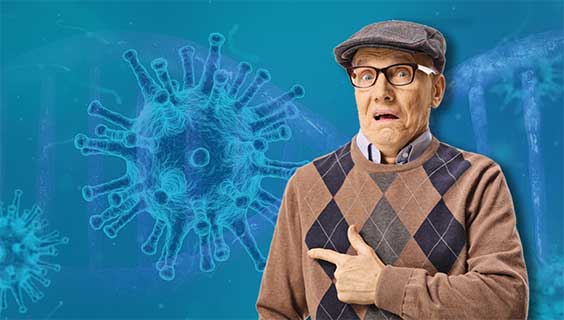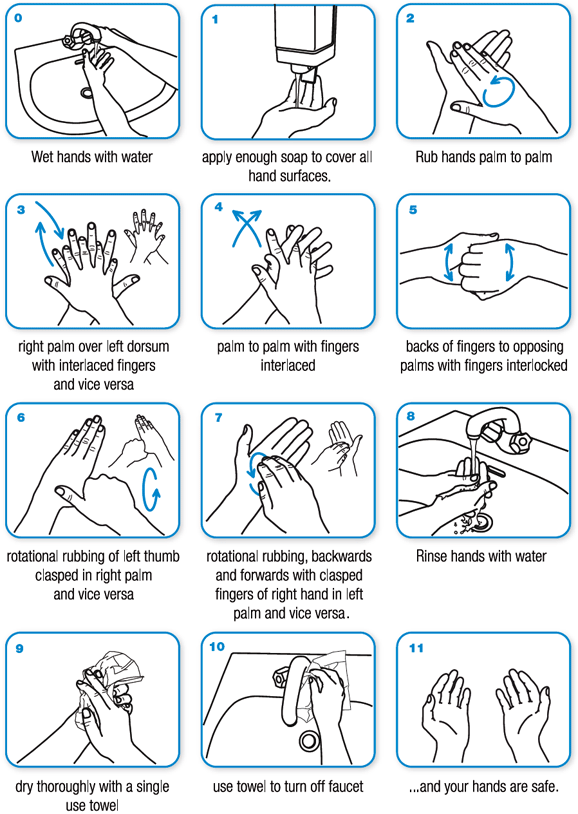COVID-19 is a new coronavirus disease that began in Wuhan, China in December 2019 and causes a respiratory infection in the lungs. Cases of coronavirus (COVID-19) are now increasing daily in the United States and while the coronavirus isn’t a death sentence, there is no doubt that it hits seniors and older adults the hardest.
A recent study in the New England Journal of Medicine found that the median age of the first 425 people infected with COVID19 was 59. This is not particularly surprising since many seniors have pre-existing health conditions and a weakened immune system due to normal aging but unfortunately, at this time there is no vaccine for COVID-19 so the best way to prevent illness is to avoid being exposed to this new virus.
What are the symptoms of coronavirus?
Coronavirus COVID-19 symptoms include:
- Fever
- Tiredness
- Dry cough
- Aches and pains
- Nasal congestion
- Runny nose
- Sore throat
- Diarrhea
How does the coronavirus spread?
You can catch the virus from others who have the virus. Coronavirus spreads from person to person through small droplets in the air when a person with the virus coughs or exhales. Droplets of the virus can also land on objects and surfaces and you can catch the virus by touching these infected surfaces and then transferring the virus into your body by touching your eyes, nose or mouth.
How does coronavirus affect the elderly?
Healthy people who catch the COVID-19 coronavirus experience an infection in the cells that line the airways in the lungs. Symptoms may include fever, cough, and shortness of breath but with plenty of rest and fluids, a healthy person’s immune system will fight the virus and they will recover to full health. In fact, about 80% of infected people recover from the virus without needing special treatment.
For elderly seniors and people with pre-existing illnesses, however, the immune system is not able to effectively fight off the virus and the disease is much more severe. In these high-risk individuals, COVID-19 can lead to pneumonia which can cause severe lung damage, acute respiratory distress syndrome (ARDS) and septic shock. ARDS and sepsis are the primary causes of death for elderly seniors who catch the COVID-19 coronavirus.
Who is at high risk for catching coronavirus?
Elderly, seniors and those who already suffer from pre-existing health issues are at the highest risk. These health issues include:
- Chronic respiratory illness
- Chronic obstructive pulmonary disease (COPD)
- Cancer
- Heart disease
- High blood pressure
- Diabetes
What is the risk of fatality?
According to a study of 45,000 cases of coronavirus in Wuhan China, the overall fatality rate was 2.3%. However, of the total cases of fatalities reported, elderly people and those with pre-existing health conditions were hit the hardest.
- Less than 1% of healthy people died
- 5.6% who had cancer, hypertension or chronic respiratory disease died
- 7.3% who had diabetes died
- 10.5% who had cardiovascular disease died
- 14.8% who were age 80 or older died
Surprisingly in this study children, especially those younger than 9 years old, did not appear to be susceptible to coronavirus and none died. “We see relatively few cases among children,” says World Health Organization (WHO) director-general Tedros Adhanom Ghebreyesus.
This study was taken from Wuhan, China, the epicenter of the COVID-19 outbreak. Recent studies in other parts of China appear to show lower fatality rates which may be because doctors now know more about this new virus and how to treat people with the disease.
However, the latest information from the WHO as of March 4, 2020, indicates that COVID-19 kills approximately 3.4% percent of all patients. WHO Director-General, Dr. Tedros Adhanom Ghebreyesus, said current figures show the infection is three times deadlier than flu, which kills less than 1% of patients on average.
The WHO 3.4% percent fatality rate is a global estimate. Death rates vary quite broadly from country to country, dependent mainly upon how modern their health systems are. In some countries, the fatality rate from COVID-19 has been as high as 4%, while in others, it’s as low as 0.7%.
Tips for seniors and older adults
- Get a flu shot
- Stay at least 3 feet away from people who are sick or coughing
- Check your prescription medication and have at least a one month supply available
- Create an emergency contact list of family friends, neighbors, doctors, and other community resources to rely on in case of an emergency
- Talk with your neighbors about emergency planning and if your neighborhood has a website or social media page, consider joining it to maintain access to neighborhood information and resources.
- Nextdoor is a neighborhood community resource you can check out.
- Consider avoiding traveling on cruise ships or airlines or to destinations where there is a COVID-19 outbreak.
- (Update March 9, 2020) The U.S. Centers for Disease Control and Prevention (CDC) is advising Americans to avoid taking cruises and says older people and others at elevated risk from COVID-19 should avoid crowded places and “non-essential” travel, including long plane rides.
- Check the CDC website for up-to-date coronavirus travel notices.
- High-risk regions currently include China, Italy, Iran, South Korea
- Also, check the US State Department for up-to-date travel advisories
- Call your doctor right away if you experience a fever or any signs of a cold or the flu
Tips for preventing coronavirus
- Wash your hands frequently with soap and water
- Soap and water kill viruses that you come in contact with.
- If soap and water are not readily available, use an alcohol-based hand sanitizer with at least 60% alcohol
- Avoid contact with people who are sick or coughing
- Coughs and sneezes can spread the virus through small liquid droplets in the air
- Stay at least 3 feet away from coughing or sick people
- Avoid touching your eyes, nose, and mouth
- Your hands may touch objects and surfaces that contain the virus.
- When you touch your hands to your eyes, nose or mouth, you can transfer the virus into your body
- Clean and disinfect frequently touched objects and surfaces
- Use a regular household cleaning spray or soap and water to clean frequently touched surfaces and objects such as tables, countertops, light switches, doorknobs, cabinet and refrigerator handles
- If you have fever, cough or difficulty breathing, seek immediate medical attention
- Local health authorities have the ability to test to see if you have either the coronavirus or ordinary flu.
What is the most important prevention tip?
According to the World Health Organization, the most important advice to protect against the COVID-19 coronavirus is to wash your hands frequently for at least 20 seconds, especially after going to the bathroom, before eating and after coughing or blowing your nose. Remember to also stay at least 3 feet away from any person who is sick or coughing.
Coronavirus Q&A
Should I be tested for COVID-19?
Call your doctor if you feel sick with fever, cough, have difficulty breathing, and have been in close contact with a person known to have COVID-19, or if you live in or have recently traveled from an area with an outbreak of COVID-19.
Should I cancel or postpone travel?
Visit the CDC COVID-19 risk assessment by country web page for up-to-date travel notices. Because COVID-19 can be more serious in older adults and those with chronic medical conditions, people in these groups should talk to a healthcare provider and consider postponing travel to destinations with level 2 and level 3 travel notices.
Should I wear a mask?
People with NO respiratory symptoms, such as a cough, do not need to wear a medical mask. The World Health Organization recommends the use of masks for people who HAVE symptoms of coronavirus so that they do not unintentionally spread their illness to others.
Can I catch coronavirus from my pet?
No. There is currently no evidence that pets such as cats and dogs can catch and spread the coronavirus.
How long can the coronavirus survive on surfaces?
Studies suggest that coronaviruses may survive on surfaces for a few hours up to several days depending upon the temperature and humidity of the environment.
How long is the incubation period for coronavirus?
The “incubation period” means the time between catching the virus and beginning to have symptoms of the disease. Most estimates of the incubation period for COVID-19 range from 1-14 days, with most symptoms appearing in around five days.
Stay up-to-date on the latest COVID-19 coronavirus information
The Centers for Disease Control and Prevention (CDC)
https://www.cdc.gov/coronavirus/2019-ncov/index.html
The World Health Organization (WHO)
https://www.who.int/emergencies/diseases/novel-coronavirus-2019
LA County Public Health Department
http://www.publichealth.lacounty.gov/media/Coronavirus/
Epidemiological Reference:
The Epidemiological Characteristics of an Outbreak of 2019 Novel Coronavirus Diseases
http://weekly.chinacdc.cn/en/article/id/e53946e2-c6c4-41e9-9a9b-fea8db1a8f51



